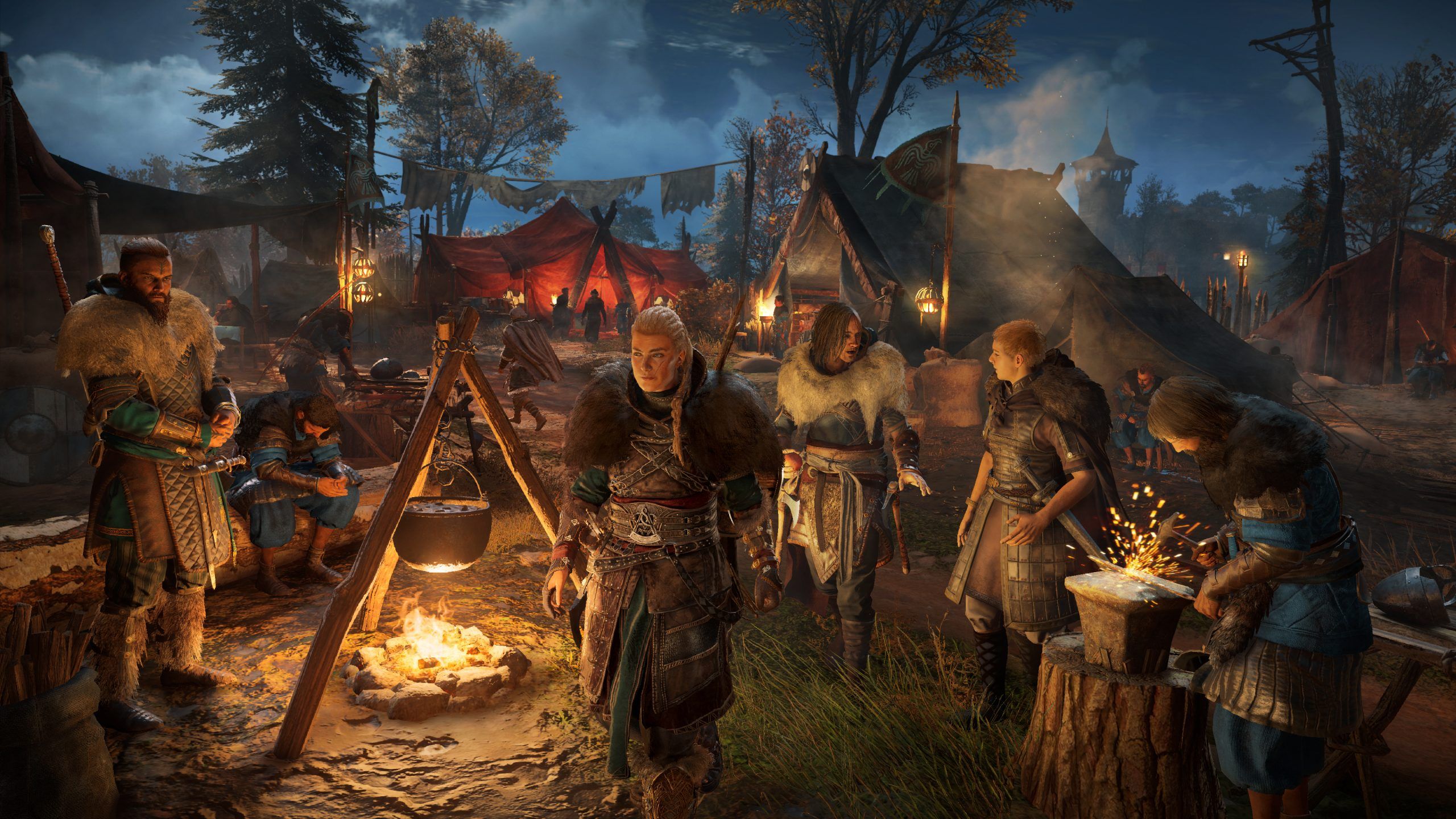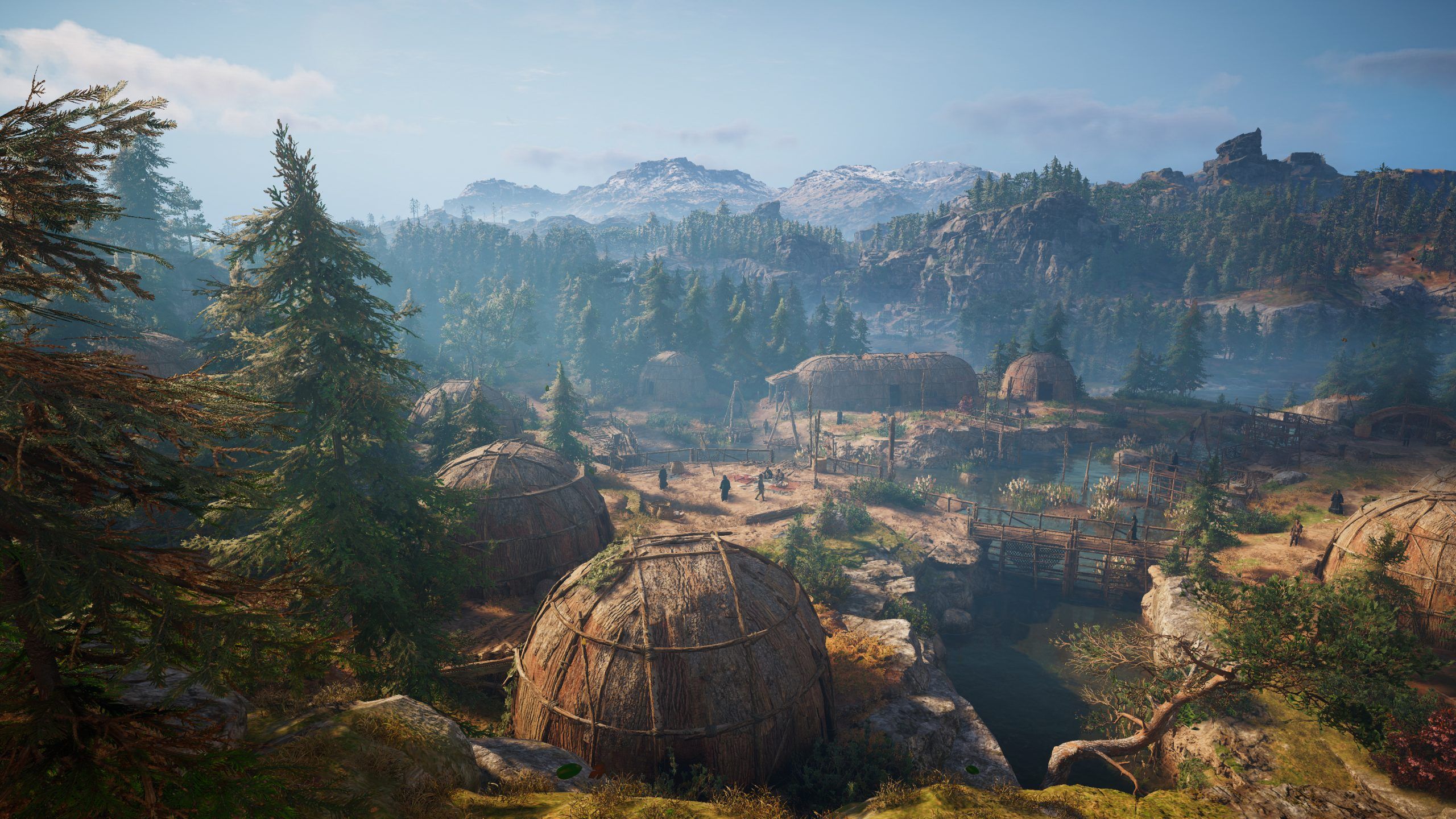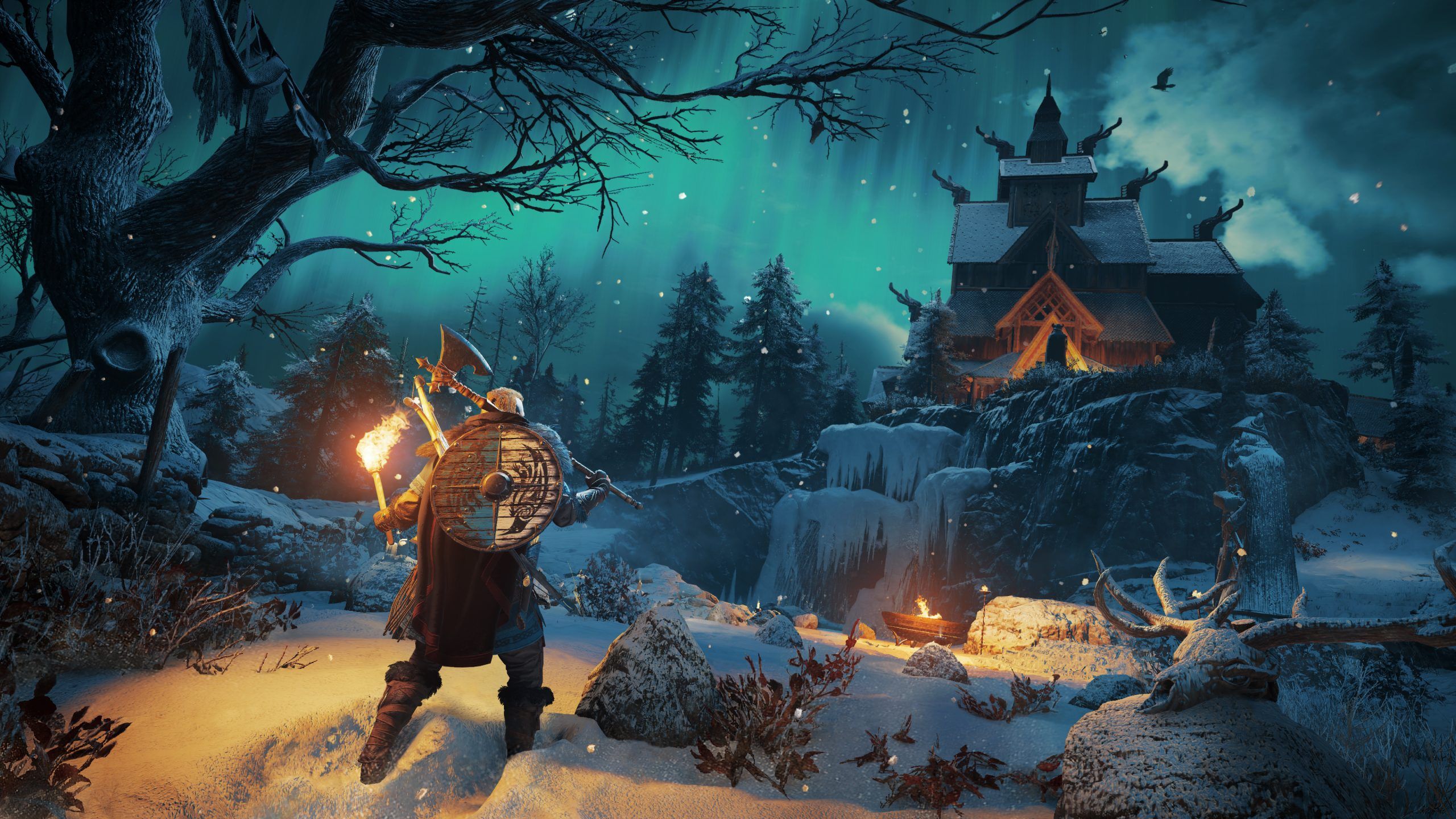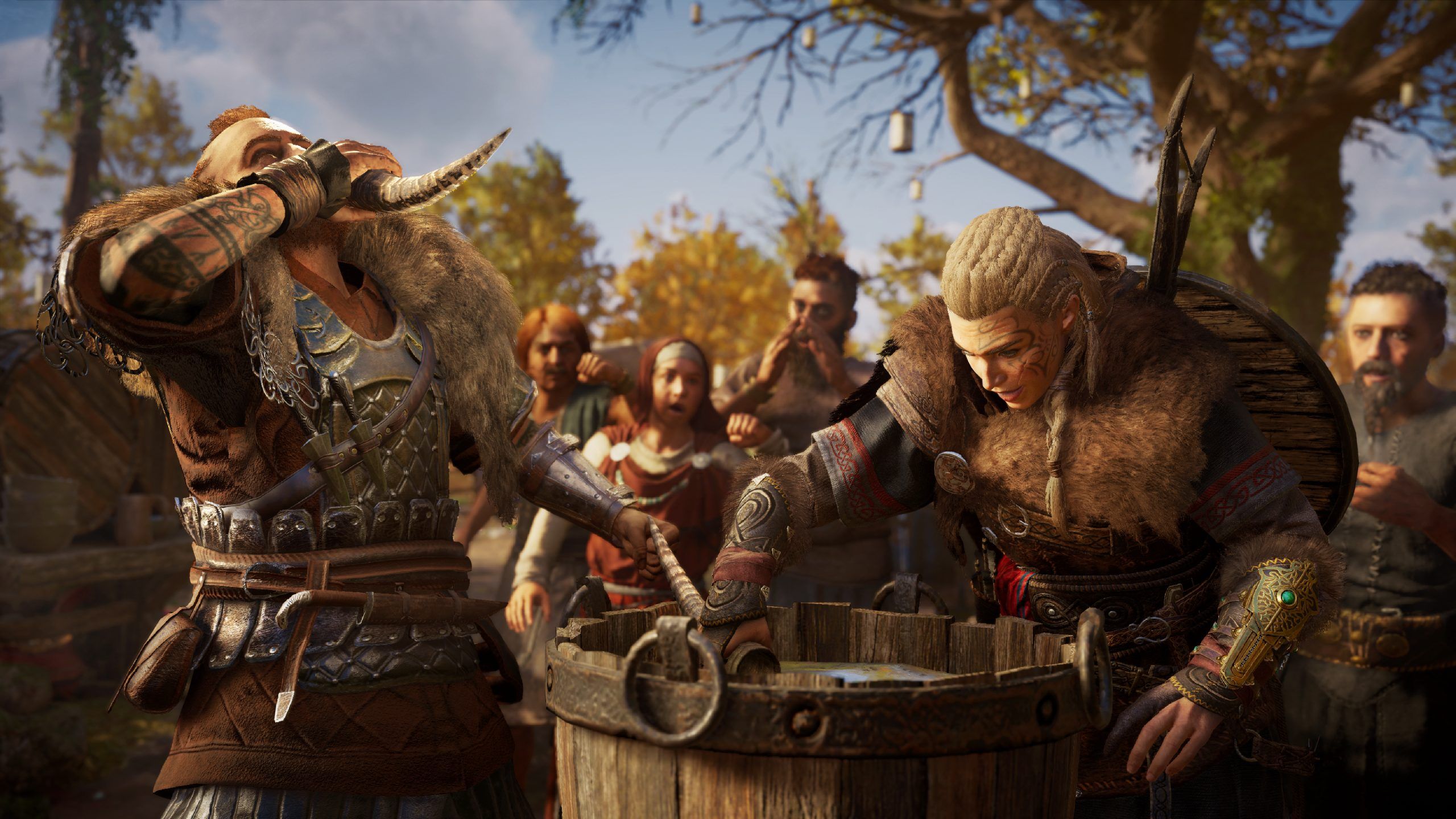Assassin's Creed Valhalla introduces fresh new features to the franchise while retaining some of the best elements that have built the series' success as early as Assassin's Creed II. Taking place during the 9th century of England, Valhalla doesn't focus on a well-known era, but that in turn makes it a little more exciting to see what is in store. After spending six hours with the game, we can guarantee there are many surprises ahead whether you're new or returning to the franchise.
Moreover, after sitting down with producer Julien Laferriere, we learned more about the goals and ambitions of Ubisoft Montreal to make Valhalla the best entry yet.
Cameron Hawkins: What motivated your choice of Vikings and Norse Mythology for this latest entry in the series?
Julien Laferriere: Right after Origins, some of us on the core team were discussing what to do next. Vikings came up very early in the discussion and we never let it go. We knew it was a fan favorite for quite a while, but we wanted to do it right.
After redesigning the whole combat system in Origins, with a focus on RPG elements and a massive open world, we felt that would lean itself very well into a Vikings setting. However, Vikings span centuries, right? So we wanted to find the best moment, and settled on the 9th century and the invasion of England. That's the golden era of Vikings for political intrigue or conflict in duality, elements which I feel are highly appreciated by fans of the franchise. You have England broken down into many kingdoms fighting each other. Vikings debarking and creating chaos. Christianity against Paganism, and obviously, all of that leads to Assassins vs. Templars. Assassin's Creed games need conflict and this specific time period is full of it.
CH: What did you learn through the criticism of Assassin's Creed Origins and how did it reflect on the changes coming in Assassin's Creed Valhalla?
JL: We started off from Origins, which we obviously have first-hand experience on, and we were fortunate enough to see the creation and reception of Assassin's Creed Odyssey. Both of these experiences helped shape Valhalla. To be honest, we took a lot of good elements from these two games and we tried to make sure they were part of this new adventure, but we also said, "Okay, what can we do differently?" Because for players, but ourselves as well, freshness is needed, and we hope players will join the ride and enjoy it. One of the changes, for example, concerns the game structure. The demo you played was a single quest arc and its format is pretty representative of how the game is shaping up. Players will do many arcs like this throughout the game. Many of the characters that you are meeting in those adventures will have some sort of wrap up to their stories. Sometimes you will see them again later on, sometimes they might come back with you to your settlement. This is a very different structure from the two previous games, because we knew we needed to have a different way for players to consume the content.
The second thing is that we knew through Origins is that players love to spend time exploring our worlds. So this time around we said, "Okay, let's focus on variety and surprise." From the way you explore the world, to the actual gameplay, we always try to have something fresh, something new. Whether it is a new puzzle, a new way of unlocking the treasure you're looking for, raids, or maybe a mini-boss battle that will come up and challenge your fighting abilities. We always try to surprise players with a different type of experience, to reward your curiosity and exploration.
Last but not least, we are making an RPG, but we've put a lot of effort to try and not gate content. We don't want to push players towards grinding or needing to unlock gated content. We've taken great care to balance and shape the game in a way where it doesn't feel grindy or gated. The player has a lot of agency in the game.
CH: After playing a few hours I noticed some of the best features across the series are all integrated into Assassin's Creed Valhalla. What are some new features that fans of the franchise can expect this time around?
JL: The way we built this game was all about making you feel like a Viking. The Viking fantasy is what it's all about and from the moment you start the game until you finish it, every activity was designed this way.
For example, the raids are a major new feature. You get on your longboat, gather your crew, and then you raid Saxon locations to pillage their resources. You bring them back to your settlement, another new major feature that changes the whole structure of the game, but also gives a lot of interesting narrative hooks. The settlement is pretty big as well with a lot of gameplay elements. Next, all of the battle system has a Viking flair to it from the abilities, the weapons that you use, and how you use them, from decapitating to dual-wielding.
Also, another major new feature is the way you explore the world. Your raven, beams of light as markers, all of that is used to make the world really immersive and reward players' curiosity. If you see something in the distance, we don't tell you exactly what it is. There will be a challenge, and you get a reward for that challenge, without necessarily relying on a world map. It really feels like you're exploring and consuming that world. This kind of caters to the fact that Vikings were famous for being famous explorers and really good at survival. All the new gameplay pillars are feeding into that Viking fantasy.
CH: What inspired the change to use a hub system versus the traditional linear flow of the series?
JL: There were a couple of reasons. I think one of the main reasons is we found out we were creating these really cool characters, but you would either never see again or see them so much later in the story that by then you have totally forgotten about them. Sometimes with the way a quest was structured, you could meet a character, do part of the quest, do something else, come back to the quest and be like, "Who's that character again?" To prevent that, we tried to make the narrative of the game much more self-supported in a way, and made sure that the characters you meet and the actions you take are reflected back on you.
In parallel, we were working on the settlement system thinking that could be a cool hub area. And because we are making a game in England, we want players to have a feeling of home. Anytime you've completed a quest arc, it is the time to feel like a Viking in your clan, so this caters to the fantasy of being a clan leader. We felt it would be a good approach to try something different and keep players on their toes, making them feel this is a really different experience.
CH: How will the expanded enemy archetypes and their AI affect combat?
JL: We've put a lot of effort on the player abilities and the player aptitude to combat, but the player is fifty percent of the battle system. The other fifty percent is the AI and the archetypes, and we built them with variety in mind. We use a system to create a variety of archetypes by plugging in some variables and adding some abilities and so on. Thanks to that, we were able to generate a decent amount of enemy archetypes, with each one of them having a certain flavor.
For example, one archetype is based on sneak attacks and will try to backstab you. Another archetype is based on fires, and will throw firebombs. Another archetype is based on teamwork so when they're in a group, they will flank you. Some enemy archetypes are all about fighting barehanded, trying to grab you and throw you. All of that is to give a different challenge, a different approach, maybe encourage players to adopt different fighting styles, change weapons, try different abilities. All of that was to make sure the game was enjoyable in the long run.
CH: While Vikings are well attuned to Norse Mythology, which significant historical figures can we expect to see throughout the game?
JL: We didn't pick the most documented period of history, but to tell you the truth, that's a bit on purpose. One great thing about Origins is, yes, we made a game about Cleopatra, but there weren't that many written artifacts about that period of history. This is even truer for the time period depicted in Valhalla. The Norse had a very old tradition of storytelling so there are not that many written documents about the Vikings. A lot was written by the Saxons, who were conquered by the Vikings, so they obviously didn't have that many nice things to say about them. So we felt we had the opportunity, by working with experts, to try to recreate the Norse perspective to all that. And because there isn't much documented, experts don't come in with their own version of the history. A lot is unknown. It gives us game devs a lot of creative freedom and what is cool with all that is how the line between folklore, legends, and historical facts is kind of blurred.
In terms of historical characters, there is King Alfred, Alfred of Wessex, who is a known character in that time period. Some characters are maybe lesser-known, but historical nonetheless. With this opus, we also have the opportunity to bring a bit of legend, so we read the sagas and tried to incorporate them in the game. When you think about it, that's exactly how the Vikings were living. They come from mythology and beliefs that gods were walking among men. Their own lives were about blurring the line between myth and reality, so this is the sort of game that we've built.
CH: Despite being a Viking, Eivor doesn't have the stereotypical personality of one. How did you approach and balance their characterization of being a rational leader, but staying true to their roots?
JL: It was important for us not to depict Vikings as mindless barbarians because they were not mindless barbarians. They were actually pretty advanced in terms of crafting. Their craftsmanship really enabled them to build amazing boats that gave them an advantage compared to their enemies at the time. This is the sort of people we wanted to depict. What were their motivations behind raiding and pillaging? Why were they doing it? They were trying to settle down. You have to understand that they're from Scandinavia which is very harsh. They were looking for a place to expand. That is why they were conquering.
Our goal is to show the people behind the myths, the people behind the legends, and to see human motivations behind all of that. Within that mindset, we wanted a main character that was true to that. So if you look at the personality of Eivor, I think you have a character that is very Scandinavian, very rational, steadfast towards danger. But also I think it is a character with a lot of duality. There is this constant struggle with their personal quest for glory and this selflessness that is characterized for clan leaders. Whether you should put yourself or your clan first. This duality is at the very heart of the character and it is also at the very heart of the narrative that we're making.
We like to put difficult decisions in the face of the player and make sure those decisions are reflected back down the road. You don't even know it but maybe you're making a tough call with consequences a couple of hours later in your story. You will feel the tension, and you don't expect the game to react to that, but it will. Difficult decision making is at the heart of what it is to be a leader, and we try to convey that both in the personality and the consequences of your actions.
CH: Since the soft reboot of the series in Assassin's Creed Origins, the series hasn't had a big connection to the actual creed. Can we expect more from the Assassin's Creed story both in and outside of the animus this time around?
JL: Yes, definitely. The present-day timeline with Layla continues. We've also found a way to blend more of the present-day storyline with the simulation, which is where you spend most of your time, with the animus anomalies. This is a way to blend the present-day narrative and feeling with the simulation. This way, we also avoid a gap of immersion, because we know some players enjoy the present-day storyline, but don't like to be disconnected from the main experience. You're still within 9th century England, but here is a taste of what present-day is. We are definitely continuing that storyline. We're trying to find clever ways to include it, and surprise players with new additions, so it is very much alive.
CH: With Assassin's Creed Valhalla being a cross-generation title, how was the process of making sure the game would be finely tuned on both current and next-generation systems?
JL: We have a great relationship with technology. Assassin's Creed 1 was a game that built its own engine to launch and we're still on that only a couple of generation aversions further down the road. We have engineers who just love technology, and for us 2020 is a next-gen year and were really happy when we were exposed to that. The good thing is our engine is mature enough so we are able to support multiple platforms. Our engine is built in a way where we can tune parameters to make sure we are optimized for a given platform. When next-gen got in, we were set in a way where it was very natural to keep evolving the engine. So when we first got our hands on on that, we were actually pretty excited to see what was possible. I think a dynamic 60 FPS is a really cool feeling to play an Assassin's Creed game. And obviously, other features like the dynamic 4K and the improved loading times kind of reshapes the whole experience. We're really happy to have next-gen right around the corner and we most definitely plan to make full new use of those new toys.
Assassin's Creed Valhalla is set to release on November 10, for Xbox Series X, Xbox Series S, Xbox One, PlayStation 4, Google Stadia, and PC, with the PS5 version releasing on the 12th. You can pre-order the game on Amazon. Current-gen players will be able to upgrade to the next-generation version for free on Xbox through Smart Delivery.




